446 scholarly books by Seagull Books and 17
have author last names that start with W
446 scholarly books by Seagull Books and 17
446 scholarly books by Seagull Books
17 have author last names that start with W have author last names that start with W
17 have author last names that start with W have author last names that start with W
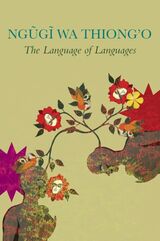
The Language of Languages
Ngugi wa Thiong’o
Seagull Books, 2023
With clear, conversational prose, this is the first book dedicated entirely to Ngũgĩ wa Thiong’o’s writings on translation.
Through his many critically acclaimed novels, stories, essays, plays, and memoirs, Kenyan writer Ngũgĩ wa Thiong’o has been at the forefront of world literature for decades. He has also been, in his own words, “a language warrior,” fighting for indigenous African languages to find their rightful place in the literary world. Having begun his writing career in English, Ngũgĩ shifted to writing in his native language Gikũyũ in 1977, a stance both creatively and politically significant. For decades now, Ngũgĩ has been translating his Gikũyũ works into English himself, and he has used many platforms to champion the practice and cause of literary translations, which he calls “the language of languages.”
This volume brings together for the first time Ngũgĩ’s essays and lectures about translation, written and delivered over the past two decades. Here we find Ngũgĩ discussing translation as a conversation between cultures; proposing that dialogue among African languages is the way to unify African peoples; reflecting on the complexities of auto-translation or translating one’s own work; exploring the essential task translation performed in the history of the propagation of thought; and pleading for the hierarchy of languages to be torn down. He also shares his many experiences of writing across languages, including his story The Upright Revolution, which has been translated into more than a hundred languages around the globe and is the most widely translated text written by an African author. At a time when dialogues between cultures and peoples are more essential than ever, The Language of Languages makes an outspoken case for the value of literature without borders.
Through his many critically acclaimed novels, stories, essays, plays, and memoirs, Kenyan writer Ngũgĩ wa Thiong’o has been at the forefront of world literature for decades. He has also been, in his own words, “a language warrior,” fighting for indigenous African languages to find their rightful place in the literary world. Having begun his writing career in English, Ngũgĩ shifted to writing in his native language Gikũyũ in 1977, a stance both creatively and politically significant. For decades now, Ngũgĩ has been translating his Gikũyũ works into English himself, and he has used many platforms to champion the practice and cause of literary translations, which he calls “the language of languages.”
This volume brings together for the first time Ngũgĩ’s essays and lectures about translation, written and delivered over the past two decades. Here we find Ngũgĩ discussing translation as a conversation between cultures; proposing that dialogue among African languages is the way to unify African peoples; reflecting on the complexities of auto-translation or translating one’s own work; exploring the essential task translation performed in the history of the propagation of thought; and pleading for the hierarchy of languages to be torn down. He also shares his many experiences of writing across languages, including his story The Upright Revolution, which has been translated into more than a hundred languages around the globe and is the most widely translated text written by an African author. At a time when dialogues between cultures and peoples are more essential than ever, The Language of Languages makes an outspoken case for the value of literature without borders.
[more]
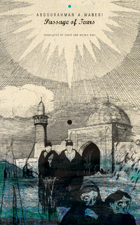
Passage of Tears
Abdourahman A. Waberi
Seagull Books, 2011
Djibouti, a hot, impoverished little country on the Horn of Africa, is a place of great strategic importance, for off its coast lies a crucial passage for the world’s oil. In this novel by Abdourahman A. Waberi, Djibril, a young Djiboutian voluntarily exiled in Montreal, returns to his native land to prepare a report for an American economic intelligence firm. Meanwhile, a shadowy, threatening figure imprisoned in an island cell seems to know Djibril’s every move. He takes dictation from his preaching cellmate known as his “Venerable Master,” but as the words are put on the page, a completely different text appears—the life of Walter Benjamin, Djibril’s favorite author.
Passage of Tears cleverly mixes many genres and forms of writing—spy novel, political thriller, diary (replete with childhood memories), travel notebook, legends, parables, incantations, and prayers. Djibril’s reminiscences provide a sense of Djibouti’s past and its people, while a satire of Muslim fundamentalism is unwittingly delivered through the other Djiboutian voice. Waberi’s inventive parody is a lesson in tolerance, while his poetic observations reveal his love and concern for his homeland.
Praise for the French Edition
“Disguised as a political thriller, Passage of Tears is above all a great novel of childhood, murderous identities, and exile.”—Le Monde des Livres
“A gripping book, burning with urgency and tension.”—Télérama.
[more]

Naming the Dawn
Abdourahman A. Waberi
Seagull Books, 2018
The poems in this new volume by Abdourahman A. Waberi are introspective and inquisitive, reflecting a deep spiritual bond—with words, with the history of Islam and its great poets, with the landscapes those poets walked, among which Waberi grew up. The sage yearns here for the simplicity of each individual moment to somehow become eternal, for the histories and people that are part of him—his mother, his wife, his unborn child, the sacred texts that ground his being—to come together harmoniously within him, and to emerge through his words. Lyrical and personal, but with powerful historical and cultural resonances, these poems are the work of a master at the height of his powers.
[more]
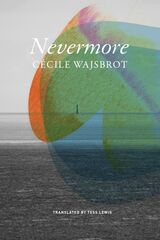
Nevermore
Cécile Wajsbrot
Seagull Books, 2024
A meditation on loss and recovery through the act of translation and its recuperative powers.
An unnamed translator mourning the loss of a close friend retreats to Dresden to translate the “Time Passes” section of Virginia Woolf’s novel To the Lighthouse. Translating this lyrical evocation of time and its devastations in a city with which the writer has no connections and where neither her language nor Woolf’s are spoken offers an interruption to the course of her life. She immerses herself in this prose poem of ephemerality.
The narrator delves into phrases from “Time Passes” and subjects them to the inexact science and imperfect art of translation. This, in turn, leads her to wide-ranging reflections on other instances of loss, destruction, and recovery—the Chernobyl disaster, the High Line in New York City, the bombing of Dresden and Wallmann’s commemorative Bell Requiem Dresden, the evacuation of the Hebridean island Foula, Hiroshi Sugimoto’s photographs of seascapes, Debussy’s “La cathédrale engloutie,” and Ceri Richards’s series of paintings by the same name. She reflects on places that are destined for decay and yet are returning to life, broken worlds in which there is still strength for a new beginning. In Tess Lewis’s visionary English translation, Cécile Wajsbrot’s lyrical exploration of the role of the writer and translator becomes an exquisite meditation on loss and recovery.
An unnamed translator mourning the loss of a close friend retreats to Dresden to translate the “Time Passes” section of Virginia Woolf’s novel To the Lighthouse. Translating this lyrical evocation of time and its devastations in a city with which the writer has no connections and where neither her language nor Woolf’s are spoken offers an interruption to the course of her life. She immerses herself in this prose poem of ephemerality.
The narrator delves into phrases from “Time Passes” and subjects them to the inexact science and imperfect art of translation. This, in turn, leads her to wide-ranging reflections on other instances of loss, destruction, and recovery—the Chernobyl disaster, the High Line in New York City, the bombing of Dresden and Wallmann’s commemorative Bell Requiem Dresden, the evacuation of the Hebridean island Foula, Hiroshi Sugimoto’s photographs of seascapes, Debussy’s “La cathédrale engloutie,” and Ceri Richards’s series of paintings by the same name. She reflects on places that are destined for decay and yet are returning to life, broken worlds in which there is still strength for a new beginning. In Tess Lewis’s visionary English translation, Cécile Wajsbrot’s lyrical exploration of the role of the writer and translator becomes an exquisite meditation on loss and recovery.
[more]
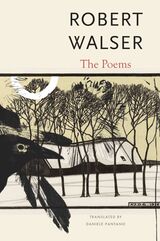
The Poems
Robert Walser
Seagull Books, 2022
The first complete publication of Robert Walser’s poems translated into English.
Admired by the likes of Kafka, Musil, and Walter Benjamin and acclaimed “unforgettable, heart-rending” by J. M. Coetzee, Swiss writer Robert Walser (1878–1956) remains one of the most influential authors of modern literature. Walser left school at fourteen and led a wandering and precarious existence while producing poems, stories, essays, and novels. In 1933, he abandoned writing and entered a sanatorium, where he remained for the rest of his life. “I am not here to write,” Walser said, “but to be mad.”
This first collection of Walser’s poems in English translation allows English-speaking readers to experience the author as he saw himself at the beginning and the end of his literary career––as a poet. The book also includes notes on dates of composition, draft versions of the printed poems, and brief biographical information on characters and locations that appear in the poems and may not be known to readers. Few writers have ever experienced such a steady rise in their reputation and public profile as Walser has seen in recent years, and this collection of his poems will help readers discover a unique writer whose off-kilter sensibility and innovations in form are perfectly suited to our fragmented, distracted, bewildering era.
Admired by the likes of Kafka, Musil, and Walter Benjamin and acclaimed “unforgettable, heart-rending” by J. M. Coetzee, Swiss writer Robert Walser (1878–1956) remains one of the most influential authors of modern literature. Walser left school at fourteen and led a wandering and precarious existence while producing poems, stories, essays, and novels. In 1933, he abandoned writing and entered a sanatorium, where he remained for the rest of his life. “I am not here to write,” Walser said, “but to be mad.”
This first collection of Walser’s poems in English translation allows English-speaking readers to experience the author as he saw himself at the beginning and the end of his literary career––as a poet. The book also includes notes on dates of composition, draft versions of the printed poems, and brief biographical information on characters and locations that appear in the poems and may not be known to readers. Few writers have ever experienced such a steady rise in their reputation and public profile as Walser has seen in recent years, and this collection of his poems will help readers discover a unique writer whose off-kilter sensibility and innovations in form are perfectly suited to our fragmented, distracted, bewildering era.
[more]

Comedies
Robert Walser
Seagull Books, 2018
This book brings English-language readers works by Walser in a rare form: dramolette.
Few writers have ever experienced such a steady rise in their reputation and public profile as Swiss writer Robert Walser (1878–1956) has seen in recent years. As more of his previously little-known work has been translated into English, readers have discovered a unique writer whose off-kilter sensibility and innovations in form are perfectly suited to our fragmented, distracted, bewildering era.
The short plays presented here, inspired by the German theater Walser enjoyed in his youth, while never meant to be performed, present scenes, characters, and situations that comment on the brutality of fairy tales, the impossibilities of love, the dark fate of the Christ child (and Walser himself), and more. At the same time, like all of Walser’s work they are shot through with a humor that is wholly genuine despite its shades of darkness. Gathering all of Walser’s plays, as well as his later, fragmentary dramatic writings, Comedies will be celebrated by the many devoted fans of this lately rediscovered master.
Few writers have ever experienced such a steady rise in their reputation and public profile as Swiss writer Robert Walser (1878–1956) has seen in recent years. As more of his previously little-known work has been translated into English, readers have discovered a unique writer whose off-kilter sensibility and innovations in form are perfectly suited to our fragmented, distracted, bewildering era.
The short plays presented here, inspired by the German theater Walser enjoyed in his youth, while never meant to be performed, present scenes, characters, and situations that comment on the brutality of fairy tales, the impossibilities of love, the dark fate of the Christ child (and Walser himself), and more. At the same time, like all of Walser’s work they are shot through with a humor that is wholly genuine despite its shades of darkness. Gathering all of Walser’s plays, as well as his later, fragmentary dramatic writings, Comedies will be celebrated by the many devoted fans of this lately rediscovered master.
[more]
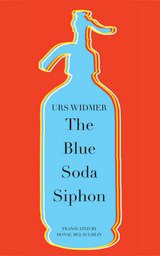
The Blue Soda Siphon
Urs Widmer
Seagull Books, 2014
A magnificent example of Widmer’s characteristic humor, literary genius, and unparalleled imagination.
In the wildly entertaining novel The Blue Soda Siphon, the narrator unexpectedly finds himself back in the world of his childhood: Switzerland in the 1940s. He returns to his childhood home to find his parents frantic because their son is missing. Then, in another switch, the young boy that he was back then turns up in the present of the early 1990s, during the Gulf War, where he meets himself as an older man, and meets his adult self’s young daughter. These head-scratching, hilarious time shifts happen when both the adult narrator and his childhood self go to the cinema and see films, the subjects of which echo their own lives.
Translated into English for the first time by Donal McLaughlin, this novel, in which the eponymous blue soda siphon bottle is a recurring symbol, is a magnificent example of Urs Widmer’s characteristic humor, literary genius, and unparalleled imagination.
In the wildly entertaining novel The Blue Soda Siphon, the narrator unexpectedly finds himself back in the world of his childhood: Switzerland in the 1940s. He returns to his childhood home to find his parents frantic because their son is missing. Then, in another switch, the young boy that he was back then turns up in the present of the early 1990s, during the Gulf War, where he meets himself as an older man, and meets his adult self’s young daughter. These head-scratching, hilarious time shifts happen when both the adult narrator and his childhood self go to the cinema and see films, the subjects of which echo their own lives.
Translated into English for the first time by Donal McLaughlin, this novel, in which the eponymous blue soda siphon bottle is a recurring symbol, is a magnificent example of Urs Widmer’s characteristic humor, literary genius, and unparalleled imagination.
[more]
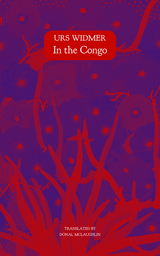
In the Congo
Urs Widmer
Seagull Books, 2015
Kuno, a male nurse in a Swiss retirement home, has a new inmate: his father. In the confines of their new home, the pair does something surprising—they finally begin to talk. Kuno had always regarded his father as a boring man without a history or a destiny, until they are thrust together and he learns that his father risked his life in the war. Stunned, Kuno embarks on a journey into his own psyche, taking him to the depths of the Congo. Here, longings awaken and dreams come true—rays of light in the darkness, meetings with kings, seductive women, and the songs of the jungle. This alluring far-away place he once regarded as the heart of darkness suddenly becomes an exciting locale of lunacy, wildness, and tests of inner strength.
In Urs Widmer’s characteristic style, In the Congo is a riveting yarn, threading through not only the relationship between a father and son, but that of Africa and Europe. Translated by Donal McLaughlin, this novel will delight Widmer fans the world over and will turn our notions of colonialism on their heads.
In Urs Widmer’s characteristic style, In the Congo is a riveting yarn, threading through not only the relationship between a father and son, but that of Africa and Europe. Translated by Donal McLaughlin, this novel will delight Widmer fans the world over and will turn our notions of colonialism on their heads.
[more]
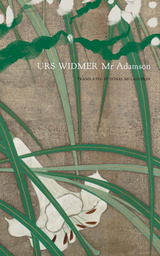
Mr Adamson
Urs Widmer
Seagull Books, 2019
The day is Friday, May 22, 2032. On this day, the day after his ninety-fourth birthday, a man is sitting in a beautiful garden. It is a paradise where he often played during his childhood, and it is here that he is recording the story of his adventures with Mr. Adamson. In the course of this compelling novel from Swiss author Urs Widmer, this man narrates his unusual story to his granddaughter, Anni. While he recounts his life, he is also waiting—waiting for the arrival of this very Mr. Adamson, whom he has not seen since the age of eight. Even then it was a mysterious encounter—a glimpse into realms that normally remain concealed to the living. For Mr. Adamson died at the very moment when our narrator was born, and he will soon return to escort the ninety-four-year-old narrator into another paradise.
Told with Urs Widmer’s signature humor, genius, and lively imagination, Mr Adamson is a superb story and a spellbinding book. With its vitality and zest for life, it manages to hold at bay that scandal we must all face in our lives: death.
Praise for Widmer
“One of the best representatives of Swiss literature.”—Le Monde
Told with Urs Widmer’s signature humor, genius, and lively imagination, Mr Adamson is a superb story and a spellbinding book. With its vitality and zest for life, it manages to hold at bay that scandal we must all face in our lives: death.
Praise for Widmer
“One of the best representatives of Swiss literature.”—Le Monde
[more]
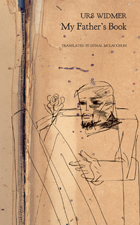
My Father's Book
Urs Widmer
Seagull Books, 2018
In this companion to Urs Widmer’s novel My Mother’s Lover, the narrator is again the son who pieces together the fragments of his parents’ stories. Since the age of twelve, Karl, the father, has observed the family tradition of recording his life in a single notebook, but when his book is lost soon after his death, his son resolves to rewrite it. Here, we get to know Karl’s friends—a collection of anti-fascist painters and architects known as Group 33. We learn of the early years of Karl’s marriage and follow his military service as the Swiss fear a German invasion during World War II, his political activity for the Communist Party, and his brief career as a teacher.
Widmer brilliantly combines family history and historical events to tell the story of a man more at home in the world of the imagination than in the real world, a father who grows on the reader, just as he grows on his son.
Widmer brilliantly combines family history and historical events to tell the story of a man more at home in the world of the imagination than in the real world, a father who grows on the reader, just as he grows on his son.
[more]
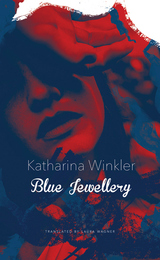
Blue Jewellery
Katharina Winkler
Seagull Books, 2018
Now in paperback, Katharina Winkler’s heartbreaking saga of a tenacious woman trapped in an abusive marriage.
Blue jewelry is private property. Not to be seen. Not to be talked about. It is worn like a bracelet around the wrists, on ribs, legs, arms. Blue jewelry is another name for the marks left on women’s bodies, inflicted by the men around them.
This novel tells the story of Filiz and Yunus. When Filiz meets Yunus, he is young and beautiful, and Filiz is proud that he wants her. Against her father’s wishes, they marry when she is thirteen. Yunus is her entire universe, all encompassing, all powerful. Soon after the wedding, Filiz’s dream of living in the West with her husband, of escaping their small village in Anatolia for freedom and autonomy, comes crashing down around her. Yunus, only a few years older than his bride, turns their marriage into a prison of dependency and violence. Trapped in her mother-in-law’s house, Filiz is subjected to physical and mental abuse, forced to veil herself, and treated as a house slave. When she becomes pregnant, Filiz seems to have reached her breaking point. But she endures. When Yunus moves his young family first to Istanbul and then to Austria, the life he had once promised her seems to be within reach. But there is no escaping the spiral of violence and love, which, to Filiz, have become inseparable.
Katharina Winkler’s powerful story of a marriage dominated by violence gives voice to a tenacious young woman whose will to survive is never broken.
Blue jewelry is private property. Not to be seen. Not to be talked about. It is worn like a bracelet around the wrists, on ribs, legs, arms. Blue jewelry is another name for the marks left on women’s bodies, inflicted by the men around them.
This novel tells the story of Filiz and Yunus. When Filiz meets Yunus, he is young and beautiful, and Filiz is proud that he wants her. Against her father’s wishes, they marry when she is thirteen. Yunus is her entire universe, all encompassing, all powerful. Soon after the wedding, Filiz’s dream of living in the West with her husband, of escaping their small village in Anatolia for freedom and autonomy, comes crashing down around her. Yunus, only a few years older than his bride, turns their marriage into a prison of dependency and violence. Trapped in her mother-in-law’s house, Filiz is subjected to physical and mental abuse, forced to veil herself, and treated as a house slave. When she becomes pregnant, Filiz seems to have reached her breaking point. But she endures. When Yunus moves his young family first to Istanbul and then to Austria, the life he had once promised her seems to be within reach. But there is no escaping the spiral of violence and love, which, to Filiz, have become inseparable.
Katharina Winkler’s powerful story of a marriage dominated by violence gives voice to a tenacious young woman whose will to survive is never broken.
[more]
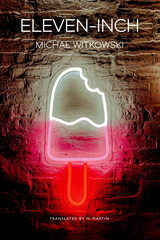
Eleven-Inch
Michal Witkowski
Seagull Books, 2021
What does it take to succeed as a queer teenage Eastern European sex worker in the 1990s? Eleven inches and a ruthless attitude.
Western Europe, shortly after the fall of the Berlin Wall: Two queer teens from Eastern Europe journey to Vienna, then Zurich, in search of a better life as sex workers. They couldn’t be more different from each other. Milan, aka Dianka, a dreamy, passive naïf from Slovakia, drifts haplessly from one abusive sugar daddy to the next, whereas Michał, a sanguine pleasure-seeker from Poland, quickly masters the selfishness and ruthlessness that allow him to succeed in the wild, capitalist West—all the while taking advantage of the physical endowment for which he is dubbed “Eleven-Inch.” By turns impoverished and flush with their earnings, the two traverse a precarious new world of hustler bars, public toilets, and nights spent sleeping in train stations and parks or in the opulent homes of their wealthy clients. With campy wit and sensuous humor, Michał Witkowski explores in Eleven-Inch the transition from Soviet-style communism to neoliberal capitalism in Europe through the experiences of the most marginalized: destitute queers.
Western Europe, shortly after the fall of the Berlin Wall: Two queer teens from Eastern Europe journey to Vienna, then Zurich, in search of a better life as sex workers. They couldn’t be more different from each other. Milan, aka Dianka, a dreamy, passive naïf from Slovakia, drifts haplessly from one abusive sugar daddy to the next, whereas Michał, a sanguine pleasure-seeker from Poland, quickly masters the selfishness and ruthlessness that allow him to succeed in the wild, capitalist West—all the while taking advantage of the physical endowment for which he is dubbed “Eleven-Inch.” By turns impoverished and flush with their earnings, the two traverse a precarious new world of hustler bars, public toilets, and nights spent sleeping in train stations and parks or in the opulent homes of their wealthy clients. With campy wit and sensuous humor, Michał Witkowski explores in Eleven-Inch the transition from Soviet-style communism to neoliberal capitalism in Europe through the experiences of the most marginalized: destitute queers.
[more]
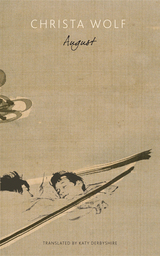
August
Christa Wolf
Seagull Books, 2019
Christa Wolf was arguably the best-known and most influential writer in the former East Germany. Having grown up during the Nazi regime, she and her family were forced to flee their home like many others, nearly starving to death in the process. Her earliest novels were controversial because they contained veiled criticisms of the Communist regime which landed her on government watch lists. Her past continued to permeate her work and her life, as she said, “You can only fight sorrow when you look it in the eye.”
August is Christa Wolf’s last piece of fiction, written in a single sitting as an anniversary gift to her husband. In it, she revisits her stay at a tuberculosis hospital in the winter of 1946, a real life event that was the inspiration for the closing scenes of her 1976 novel Patterns of Childhood. This time, however, her fictional perspective is very different. The story unfolds through the eyes of August, a young patient who has lost both his parents to the war. He adores an older girl, Lilo, a rebellious teenager who controls the wards. Sixty years later, August reflects on his life and the things that she taught him.
Written in taut, affectionate prose, August offers a new entry into Christa Wolf’s work and, incidentally, her first and only male protagonist. More than a literary artifact, this new novel is a perfectly constructed story of a quiet life well lived. For both August and Christa Wolf, the past never dies.
August is Christa Wolf’s last piece of fiction, written in a single sitting as an anniversary gift to her husband. In it, she revisits her stay at a tuberculosis hospital in the winter of 1946, a real life event that was the inspiration for the closing scenes of her 1976 novel Patterns of Childhood. This time, however, her fictional perspective is very different. The story unfolds through the eyes of August, a young patient who has lost both his parents to the war. He adores an older girl, Lilo, a rebellious teenager who controls the wards. Sixty years later, August reflects on his life and the things that she taught him.
Written in taut, affectionate prose, August offers a new entry into Christa Wolf’s work and, incidentally, her first and only male protagonist. More than a literary artifact, this new novel is a perfectly constructed story of a quiet life well lived. For both August and Christa Wolf, the past never dies.
[more]
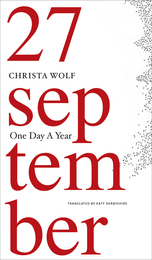
One Day a Year
2001–2011
Christa Wolf
Seagull Books, 2017
During a 1960 interview, East German writer Christa Wolf was asked a curious question: would she describe in detail what she did on September 27th? Fascinated by considering the significance of a single day over many years, Wolf began keeping a detailed diary of September 27th, a practice which she carried on for more than fifty years until her death in 2011. The first volume of these notes covered 1960 through 2000 was published to great acclaim more than a decade ago. Now translator Katy Derbyshire is bringing the September 27th collection up to date with One Day a Year—a collection of Wolf’s notes from the last decade of her life.
The book is both a personal record and a unique document of our times. With her characteristic precision and transparency, Wolf examines the interplay of the private, subjective, and major contemporary historical events. She writes about Germany after 9/11, about her work on her last great book City of Angels, and also about her exhausting confrontation with old age. One Day a Year is a compelling and personal glimpse into the life of one of the world’s greatest writers.
The book is both a personal record and a unique document of our times. With her characteristic precision and transparency, Wolf examines the interplay of the private, subjective, and major contemporary historical events. She writes about Germany after 9/11, about her work on her last great book City of Angels, and also about her exhausting confrontation with old age. One Day a Year is a compelling and personal glimpse into the life of one of the world’s greatest writers.
[more]
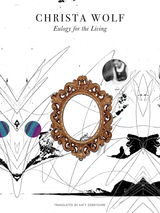
Eulogy for the Living
Taking Flight
Christa Wolf
Seagull Books, 2018
A fragmentary work that stands as a testament to Wolf's skill as a thinker, storyteller, and memorializer of humanity’s greatest struggles.
Christa Wolf tried for years to find a way to write about her childhood in Nazi Germany. In her 1976 book Patterns of Childhood, she explained why it was so difficult: “Gradually, over a period of months, the dilemma has emerged: to remain speechless or to live in the third person, these seem to be the options. One is impossible, the other sinister.” During 1971 and 1972 she made thirty-three attempts to start the novel, abandoning each manuscript only pages in. Eulogy for the Living, written over the course of four weeks, is the longest of those fragments. In its pages, Wolf recalls with crystalline precision the everyday details of her life as a middle-class grocer’s daughter, and the struggles within the family—struggles common to most families, but exacerbated by the rise of Nazism. And as Nazism fell, the Wolfs fled west, trying to stay ahead of the rampaging Red Army.
Christa Wolf tried for years to find a way to write about her childhood in Nazi Germany. In her 1976 book Patterns of Childhood, she explained why it was so difficult: “Gradually, over a period of months, the dilemma has emerged: to remain speechless or to live in the third person, these seem to be the options. One is impossible, the other sinister.” During 1971 and 1972 she made thirty-three attempts to start the novel, abandoning each manuscript only pages in. Eulogy for the Living, written over the course of four weeks, is the longest of those fragments. In its pages, Wolf recalls with crystalline precision the everyday details of her life as a middle-class grocer’s daughter, and the struggles within the family—struggles common to most families, but exacerbated by the rise of Nazism. And as Nazism fell, the Wolfs fled west, trying to stay ahead of the rampaging Red Army.
[more]

Beachlight
Poems
Cyril Wong
Seagull Books, 2023
A profound poem on the mystical and the ecstatic and about our connection with nature.
Beachlight is a sustained poem divided into smaller parts that take on the anonymous voices of those lost and forgotten. A walk along a Singaporean beach transforms into a meditation that bridges an ecological consciousness to the sexual and the homoerotic. The poems in Beachlight expose revelations about the nature of desire, inviting readers to walk beside—and inside—them, reminding us of what we gain when we abandon ourselves to nature and exhorting us to reclaim our primordial connections to the world and to one another.
Beachlight is a sustained poem divided into smaller parts that take on the anonymous voices of those lost and forgotten. A walk along a Singaporean beach transforms into a meditation that bridges an ecological consciousness to the sexual and the homoerotic. The poems in Beachlight expose revelations about the nature of desire, inviting readers to walk beside—and inside—them, reminding us of what we gain when we abandon ourselves to nature and exhorting us to reclaim our primordial connections to the world and to one another.
[more]
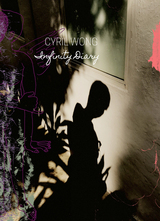
Infinity Diary
Cyril Wong
Seagull Books, 2020
This volume of poems by Cyril Wong, one of the leading figures of poetry in Singapore, reflects the many ways in which love between two men can unfold, balancing emotional outpourings with meditations on the nature of relationships. The poetry punctures the sometimes oppressive reality of life in a city that is hypermodern yet far from free and, through twists and turns, ultimately lifts the reader to a place beyond pleasure and pain. Sensual, anecdotal and, of course, confessional, Infinity Diary charts an evolution in the work of one of Asia’s most intimate English-language poets.
[more]
READERS
Browse our collection.
PUBLISHERS
See BiblioVault's publisher services.
STUDENT SERVICES
Files for college accessibility offices.
UChicago Accessibility Resources
home | accessibility | search | about | contact us
BiblioVault ® 2001 - 2024
The University of Chicago Press









